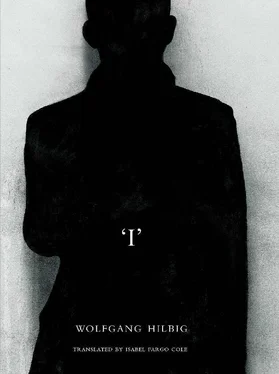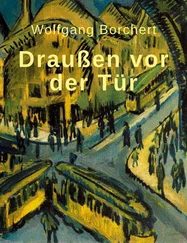C. looked out at the show, the usual picture: amid the fog of the exhaust fumes the automobile cohorts roared down the lanes and whirled their lights’ trailing reflexes through the blue-grey dusk, the big glass pane jittered, and the motors howled; and by degrees the vast multitude of these racing vehicles let fall in the city a mighty thunder which people had already ceased to hear, and the years of uninterrupted thunder were slowly demolishing the world. And when C. looked out the window long enough, everything seemed to stand still out- side, while the cafe interior fled nightwards in ever-greater surges of speed. .)
When he opened his eyes for the second time, his headache was gone. The scent of coffee came from Frau Falbe’s kitchen, across the hall and into the bedroom, both doors were ajar, he heard the clink of dishes and the clatter of silverware. W. had meant to sneak out down the hall, but it was impossible now that he’d smelt the coffee; perhaps the very smell had banished his headache. And he recalled a thought he’d sometimes had: Why shouldn’t he act the artist and embrace the advantages that entailed. . life was comfortless enough as it was, many writers he knew from the Scene scraped by with the bare minimum and still let no one spoil their fun. Soon enough he’d have to realize, yet again, that something in him was unsuited for this existence. . or he’d have it proven to him. So why should he sneak away from a table set for coffee just because of a harmless attack of impotence. . Frau Falbe was a woman of experience. — And she didn’t even mention the incident when at last, having taken a cold shower in the bathroom, he perched in his underwear on the edge of a chair in her kitchen attempting to dispatch the Turkish-style beverage (Frau Falbe had experience in these things as well) down his swollen gullet in the largest possible swigs. — He was sitting here in his underwear. . that meant the rest of his clothes were down in his room, where, back from the pub, he had first undressed before hitting on the idea of going upstairs and ringing the doorbell again. And now it occurred to him that his ringing had been prolonged, he’d had to turn on the stairwell light at least five times and ring unremittingly before there was any sign of life behind her door. And then he’d collapsed into bed next to her and at the first attempt to embrace her he’d fallen asleep. And he’d kept babbling uncontrollably about the gun, about Harry and Feuerbach, about the story he had to hear again. . He turned uneasy, nearly flinching: Had he really blurted out the name Feuerbach? He was sure he hadn’t talked; before Frau Falbe could even start in on the story he’d already been snoring. . if necessary the name Feuerbach could be explained as the preliminary stage of a snore.
Your eyes are blazing red, she said once, when he glanced up because she’d spoken. — She’d been saying that Harry had also been like that a lot when he got up. . she guessed he hadn’t heard that. But probably it’s getting on your nerves already, the way I’m always talking about him? — No, he said, go on talking. — He didn’t even notice any more that she steadfastly maintained the formal ‘you’, completely ignoring what had been going on between them for several nights now. . and in fact it wasn’t disagreeable, it simplified the situation for him when all he could think of was disappearing. — But last night you wanted to know exactly how it was when they came for Harry, she said. I’ll tell you sure enough. — You already told me, said W. — Yes. . I can see it’s time for you to go again. . W. thought he heard a touch of regret in her voice; she was drying the hair on the back of his head with a towel. I know, you have to go into town again. Just don’t get caught by that guy who’s looking for you. . you know. And don’t get caught by the longlegs who was here the other day!
W. ran down the stairs in his underwear; he found that he had left the key in the lock, fortunately on the outside. . but first he listened a minute for someone in the room. . and inside, from the door, he peered about for anything that might have changed. — All the while he had the feeling that Feuerbach would come in at any moment. .
In his room he sat in the red armchair and let time pass by. . he was actually rested and felt good, the second three or four hours of sleep up at his landlady’s had dispelled the paralytic after-effects of his bender. A newspaper lay on the desk, which he recalled buying two days ago; the day before yesterday exactly four weeks had passed since Feuerbach had vanished from the city! He didn’t know why he assumed Feuerbach’s absence would be limited to a month. . that was just how it usually was, and if someone wasn’t away for four weeks, he was away for three months; one could say those were the established timeframes for official business. And so it wasn’t unreasonable to think that for the past two days his boss had been waiting for him. — It was now twenty past four in the afternoon (judging by the alarm clock on the floor by the cot. . his watch was anything but reliable); even if he set out this moment, he’d never reach the cafe on Frankfurter Allee by five. Five p.m. was one of the times Feuerbach tended to set for their meet-ups. . another time was 7 p.m.; he could easily make it by then. There was no need to hurry; he could tidy up the desk first, where scribbled paper, illegibly scribbled paper, had proliferated once again. He folded up the papers one by one into the smallest possible packets and stuffed them into the crack between the seat and back of his red armchair.
And he still had time to brace himself for Feuerbach: he could expect their first meeting after the break to take a nasty turn.—W. didn’t have the least little report ready! It was awkward enough when a week passed with nothing to show. Then Feuerbach would clearly indicate that he was under pressure, but leave it at a few snide comments. Only once had he held out on the first lieutenant for longer than two weeks; that had been the affair with the profiles (the workshop at the Protestant church in Rummelsburg. . The matter seemed to have blown over, yet probably hadn’t been forgotten). . but there were a few cases in which W. hadn’t delivered for ten days or so — and Feuerbach started acting like an idiot. He stuck his hand up W.’s shirt or way below his waistband, or he patted down all his pockets, in the middle of the cafe he pulled up W.’s trousers and hunted around in his socks. — Go on, tell me, where’ve you got the paperwork? he asked so loudly that you could hear it at all the surrounding tables. It looked like horseplay, but if W. still had nothing to show the next day, the first lieutenant’s face darkened, and there was a jitter or hiss in his voice. — Once, W. recalled, Feuerbach had nearly taken his joking too far. They were leaving a pub, slightly drunk, there had been a scene about missing reports, but now they were friends again; in a dark, out-of-the-way street W. suddenly felt a blow between the shoulder blades, so rough it hurled him against a wall. . and his case officer had actually drawn his gun. — Hands on the wall, spread your legs! Feuerbach growled. Cough it up, where’d you hide the goddamn paper! — And a moment later they both succumbed to a prodigious burst of laughter, gurgling and screeching until it echoed up the walls. . but for W. there was a very queasy feeling about it: it was the first time in his life he’d looked down the barrel of a gun.
And now he’d gone four whole weeks without getting anything done! It was a safe bet that Feuerbach knew he’d been in the Scene quite a bit; this month there’d been one or two weeks in which he’d actually gone more often than usual. . most of his visits had been short, though (too short, another thing the first lieutenant wasn’t happy about) — as if he’d just been looking for someone.
Читать дальше












